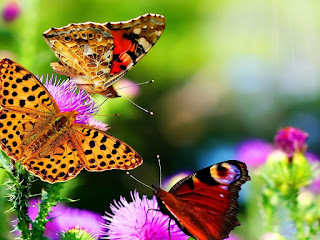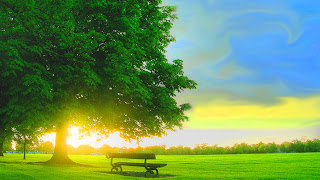
I declare this world is
so beautiful that I can hardly believe it exists.” The beauty of nature
can have a profound effect upon our senses, those gateways from the outer world
to the inner, whether it results in disbelief in its very existence as Emerson
notes, or feelings such as awe, wonder, or amazement. But what is it
about nature and the entities that make it up that cause us, oftentimes
unwillingly, to feel or declare that they are beautiful?
One answer that Emerson offers is that “the simple perception of natural
forms is a delight.” When we think of beauty in nature, we might most
immediately think of things that dazzle the senses – the prominence of a
mountain, the expanse of the sea, the unfolding of the life of a flower.
Often it is merely the perception of these things itself which gives us
pleasure, and this emotional or affective response on our part seems to be
crucial to our experience of beauty. So in a way there is a correlate
here to the intrinsic value of nature
Most often, it seems to
me, we find these things to be beautiful not because of something else they
might bring us – a piece of furniture, say, or a ‘delicacy’ to be consumed –
but because of the way that the forms of these things immediately strike us
upon observation. In fact, one might even think that this experience of beauty
is one of the bases for valuing nature – nature is valuable because it
is beautiful.
Emerson seems to think that beauty in the natural world is not limited to
certain parts of nature to the exclusion of others. He writes that every
landscape lies under “the necessity of being beautiful”, and that “beauty
breaks in everywhere.” As we slowly creep out of a long winter in the
Northeast, I think Emerson would find the lamentations about what we have
‘endured’ to be misguided
The inhabitants of the cities suppose that the country
landscape is pleasant only half the year….To the attentive eye, each moment of
the year has its own beauty, and in the same field it beholds, every hour, a
picture which was never seen before, and which shall never be seen again.
The
close observer of nature sees a river in constant flux, even when the river’s
water is frozen and everything appears to be static and unchanging for a time.
Nature can reveal its beauty in all places and at all times to the eye that
knows how to look for it. We can hear Emerson wrangle with himself on this very
point in the words of this journal entry:
At night I went out into the dark and saw a glimmering star
and heard a frog, and Nature seemed to say, Well do not these suffice?
Here is a new scene, a new experience. Ponder it, Emerson, and not like
the foolish world, hanker after thunders and multitudes and vast landscapes,
the sea or Niagara.

Nothing is quite beautiful alone: nothing but is beautiful in the whole.
All of these qualities of beauty seem to go beyond the mere impression of sensible forms that we started with, and what they require is what also served as the basis of truth and goodness in nature.






No comments:
Post a Comment